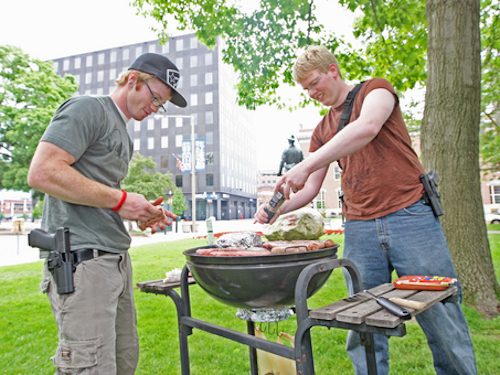In April, gun owners gathered outside the Michigan state capitol building in Lansing for an Open Carry Rally, in which they showed off their loaded guns to urge Michigan legislators to loosen gun control laws. “It’s wonderful to be around like-minded people who understand how the government should work,” attendee Johann Deffert told Michigan Live, adding that the crowd was very diverse. In theory, of course, our system of government works entirely on the basis of like-minded people. In practice, a little over half of Americans support tightening gun control laws, and only 8% think they should be loosened. As an open carry rally reminds us, however, that 8% is politically engaged and heavily armed.
I first learned about open carry rallies in this New York Times editorial, which asks a pertinent question: how does my peaceful public demonstration change when I’m holding a gun? Open-carry advocates have argued that in such contexts, wearing a gun is a form of speech, protected not just by the Second Amendment but also the First. Consider this statement from Ohio Carry:
The third way we advocate for firearm education is by getting out into the public eye while carrying our firearms! The only way for us to show people that law abiding people may possess and carry firearms, that open carry is a viable option for certain situations, and to educate them about the law is for us to get out there and talk one on one with the general public.
I assume that plenty of people see Ohio Carry members walking around with guns and realize that it would be legal for them to walk around with guns, too. A certain number of other people probably see them and think, “that guy could kill me.” A gun on your hip expresses your attitude toward the Second Amendment, but it remains a weapon. When you go to a public place with a firearm, you are reserving the option to kill anyone there.
We don’t generally think of armed people in public as likely to kill us, partly because we are not in conflict with them. When I see someone who is not a cop or security guard walking around with a gun, I lump him in with the adult karate students as a man irritatingly fascinated by self-defense. But a political demonstration is inherently different. Going out in public to express your political views necessarily brings you into low-level conflict with the people who might disagree with you.
As conflict goes, political disagreement is safe and even good. We’ve got a whole society going that allows us to argue and resolve ourselves in controlled, non-destructive ways, and it’s great better than other systems. But the dynamic changes as soon as one side arms itself.
Let’s say you and I are arguing about whether my enjoyment of the newish Kesha song “Timber” makes me a hypocrite, given my stated opposition to her over the years. Each of us feels strongly about the issue, and we agree to marshal evidence and talk the thing out in our local park, where we will hopefully come to agreement. When you arrive with your notecards, you find that I am carrying an AR-15.
How has our discourse changed? In theory, everything is exactly the same. Obviously, I’m not going to use my semiautomatic rifle to shoot you. I just brought it because I feel strongly about my right to bear arms, and in case someone in the park engages me in combat to the death. Anyway, let’s start arguing about our deeply-held beliefs.
A gun is a threat. It is a tool whose purpose is to kill people and animals, and it changes the atmosphere of discourse in the same way that walking in with a claw hammer changes the atmosphere of the china shop. Bringing a gun to a political rally is not the same as shooting someone at that rally, but it’s not the same as showing up unarmed, either.
Consider Cliven Bundy’s disagreement with the Bureau of Land Management. Bundy got his way, not because he mounted a cogent legal argument or convinced America that he was right, but because a bunch of his supporters showed up with guns. The BLM concluded that it was not safe to enforce federal policy in that environment, and so a few dozen people overruled the US government. Would that have happened if people came from all over the country with signs?




